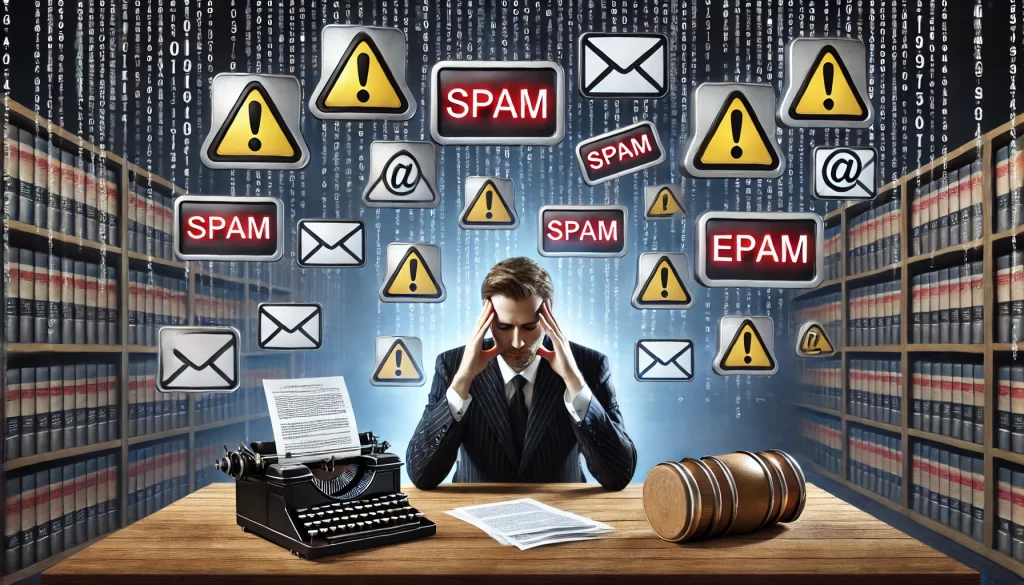What Are Spam Email Laws and Why Are They Relevant?
In today’s digital age, email marketing has become a vital tool for businesses, including law firms, to engage with clients, prospects, and other stakeholders. However, with the power to send emails to a broad audience comes the responsibility to adhere to spam email laws.
Spam email laws are designed to protect individuals from unsolicited and potentially harmful communications. These laws regulate how businesses, including law firms, can reach out to people via email, ensuring recipients are not bombarded with unwanted marketing content. The CAN-SPAM Act (Controlling the Assault of Non-Solicited Pornography and Marketing) is the most widely known legislation in the United States, but other laws, such as GDPR (General Data Protection Regulation) in Europe, impose similar rules. For law firms, understanding spam email laws is crucial. Failure to comply with these laws can result in hefty fines and damage to the firm’s reputation. This article explores the basics of spam email law, how law firms can stay compliant, and the common mistakes to avoid in email marketing.
What Exactly is Spam Email?
Spam emails are unsolicited and often irrelevant messages sent in bulk to a large number of recipients. Typically, these emails are sent for advertising or phishing purposes. Spam emails not only clutter inboxes but also pose a security risk to recipients. Therefore, various governments have implemented laws to limit such emails and protect users.
Spam email laws are designed to address these concerns by:
- Setting rules for obtaining consent before sending marketing emails.
- Mandating the inclusion of opt-out options in marketing emails.
- Requiring transparency about the identity of the sender.

How Law Firms Can Stay Compliant with Spam Email Laws
Compliance with spam email laws is essential for law firms to avoid legal issues and protect their reputations. Adhering to these laws requires careful attention to detail, especially in email marketing practices.
Provide an Easy Unsubscribe Option
One of the core requirements of spam email laws, especially under the CAN-SPAM Act, is to provide recipients with a clear and easy-to-use method to opt out of receiving future marketing emails. Law firms should ensure that every marketing email contains an unsubscribe link that is visible and functional.
The CAN-SPAM Act requires that unsubscribe requests be honored within 10 business days. It’s also good practice for law firms to process these requests promptly, to maintain a positive relationship with recipients and minimize legal risks.
Obtain Clear Consent for Sending Emails
Consent is a key aspect of spam email laws, particularly in the context of the GDPR. The GDPR mandates that businesses cannot send marketing emails to individuals unless they have obtained explicit consent. Law firms should use double opt-in processes where users confirm their intent to receive marketing emails.
For law firms, this means getting explicit consent from clients before sending newsletters or other promotional content. Keeping records of this consent is also crucial for future compliance.
Include Accurate Sender Information
Spam email laws require that all commercial emails, including those from law firms, clearly identify the sender. The CAN-SPAM Act mandates that emails contain a valid return email address and the firm’s physical address.
Failure to include accurate contact information can lead to violations and penalties. Additionally, using misleading or deceptive subject lines is prohibited under these laws.
Don’t Send Emails to Unsolicited Contacts
One of the most straightforward ways to stay compliant with spam email laws is by avoiding sending emails to people who have not opted in. Law firms should not collect email addresses from third-party sources or scrape contact information from websites without consent.
If your law firm has obtained email addresses through public or questionable means, it’s critical to clean up your email lists and ensure that all recipients have explicitly opted in to receive communications.
Maintain Proper Records of Consent and Opt-Out Requests
Documenting consent is crucial for law firms to demonstrate compliance. Keeping records of when and how a contact consented to receive emails can protect the firm in case of a dispute or investigation. Similarly, law firms should maintain accurate records of unsubscribe requests and the steps taken to honor them.

Common Pitfalls Law Firms Make in Email Marketing
Even with the best intentions, law firms can inadvertently fall into common traps when it comes to email marketing. Understanding these pitfalls and proactively avoiding them is key to maintaining compliance with spam email laws.
Failing to Provide an Unsubscribe Option
Despite the clear requirement under the CAN-SPAM Act, some law firms fail to include an easy-to-find unsubscribe option in their marketing emails. This is one of the most common violations and can result in legal consequences. Always ensure that every marketing email includes a functional unsubscribe link.
Using Misleading or Deceptive Subject Lines
Spam email laws explicitly prohibit the use of deceptive subject lines to trick recipients into opening emails. For instance, using subject lines like “Important Information” when the content is purely promotional can lead to violations.
Law firms should be transparent and honest in their subject lines to avoid penalties and maintain trust with clients.
Ignoring Regional Differences in Spam Laws
Spam email laws vary depending on the region. For example, CAN-SPAM applies in the United States, while GDPR governs email marketing practices in Europe. Many law firms fail to account for these regional differences and may inadvertently breach laws when communicating with clients from other regions. To stay compliant, law firms must familiarize themselves with both local and international spam laws and adjust their marketing practices accordingly.
Not Honoring Unsubscribe Requests Promptly
Another common mistake is not processing unsubscribe requests promptly. The CAN-SPAM Act mandates that unsubscribes be processed within 10 business days, but it’s better practice to process them immediately. Delays in removing clients from email lists can damage the law firm’s reputation and lead to legal penalties.
Sending Emails to Purchased Lists
While purchasing email lists may seem like an easy way to expand your marketing reach, it’s fraught with risks. Sending emails to individuals who have not opted into receiving your emails is a clear violation of spam email laws. It can also result in being flagged as a spammer, causing long-term damage to the firm’s email marketing efforts.
Stay Compliant with Spam Laws – Let Us Help You
Ensuring that your law firm complies with spam email laws can be a complex process, but it’s essential for protecting both your business and your clients. If you’re unsure whether your email marketing campaigns are fully compliant, it’s time to seek professional assistance.
Contact us today to ensure your law firm’s email marketing is both effective and legally compliant. We can help you set up systems for obtaining consent, handling unsubscribe requests, and staying up to date with regional spam regulations. Let us help you safeguard your firm from potential legal issues and keep your email campaigns running smoothly.
FAQs
What are spam email laws?
Spam email laws regulate the sending of unsolicited or bulk emails. These laws, such as the CAN-SPAM Act and GDPR, ensure that recipients have control over the emails they receive and mandate businesses, including law firms, to offer an unsubscribe option, obtain consent, and provide accurate contact information.
How can law firms stay compliant with spam email laws?
Law firms can stay compliant by including a clear unsubscribe option in all emails, obtaining explicit consent from recipients before sending marketing emails, maintaining accurate contact information, and processing unsubscribe requests promptly.
What are the penalties for violating spam email laws?
Violating spam email laws can result in significant fines. Under the CAN-SPAM Act, penalties can reach up to $43,280 per violation. Law firms that fail to comply with GDPR may face fines of €20 million or 4% of global turnover, whichever is higher.
What mistakes should law firms avoid in email marketing?
Law firms should avoid common pitfalls like failing to provide an unsubscribe option, using misleading subject lines, ignoring regional differences in spam laws, not processing unsubscribe requests promptly, and sending emails to purchased email lists.
How can law firms prevent being marked as spammers?
To prevent being marked as spammers, law firms should avoid sending unsolicited emails, maintain accurate and clean email lists, ensure clear communication with recipients, and comply with all relevant spam email laws.
Key Takeaways
Spam email laws, such as the CAN-SPAM Act and GDPR, are critical for law firms to understand and follow. By ensuring compliance with these laws, law firms can avoid hefty penalties, enhance their email marketing practices, and maintain trust with their clients. It’s important to avoid common mistakes, like failing to provide an unsubscribe option or using deceptive subject lines, to stay within the legal boundaries and build a positive reputation.
- Spam email laws require law firms to provide an easy unsubscribe option and obtain consent before sending marketing emails.
- Failing to comply can result in fines and damage to the firm’s reputation.
- Common pitfalls to avoid include using misleading subject lines, not processing unsubscribe requests promptly, and sending emails to purchased lists.
